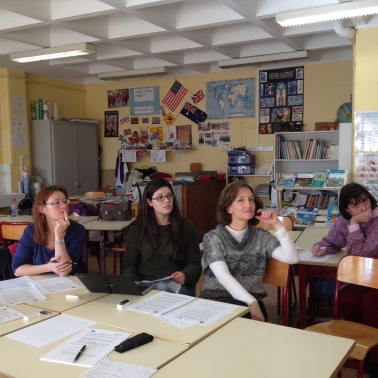An iTILT teacher training session at a primary school in Antibes, near Nice, this month involved primary teachers and teacher trainers involved with language education and technology training, as well as newly-qualified secondary EFL teachers.

Training materials included
- the pilot version of the iTILT training manual, with its focus on task-based language teaching (TBLT)
- the iTILT website, with
- practice examples (video clip, description, participant commentaries, related clips, tags)
- quick/advanced search functions, manuals in several languages, and sample IWB teaching resources
- new video training materials developed in collaboration with our German iTILT partners in Schwäbisch-Gmünd.
We explained that this second iTILT project uses the same approach to teacher education, involving class films, learning focus group interviews, and video-stimulated recall session with participating teachers. However, based on the first project’s results, we now have a focus on a new objective:
- How can we encourage more interactivity and interaction in the
 foreign language classroom?
foreign language classroom?
The goal is thus to consider not tools, but rather pedagogical factors.
During our review of the first iTILT project activities and findings, we examined two video examples in particular: the magic schoolbag (primary EFL, FR), hotel furniture (vocational French, DE).
The new project involves a teacher who was also part of the first one: here we see her in the same classroom at the same board as she used in iTILT 1.
The French project teachers are working on video communication in English as a lingua franca using class sets of iPads (primary) and iPods (secondary) to exchange short videos with partner classes abroad, as well as some live videoconference sessions.
In keeping with our goal of developing TBLT approaches, the focus is on developing activities which include
- emphasis on making meaning and exchanging messages
- an information gap or other cognitively challenging premise
- the opportunity for learners to use their own linguistic resources
- a particular outcome for each task.
One thought on “iTILT training: French participants”